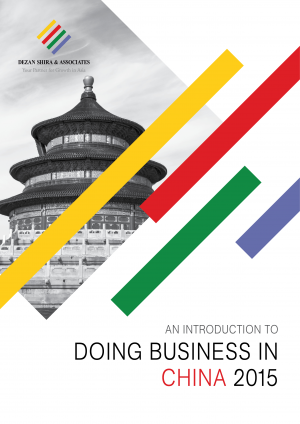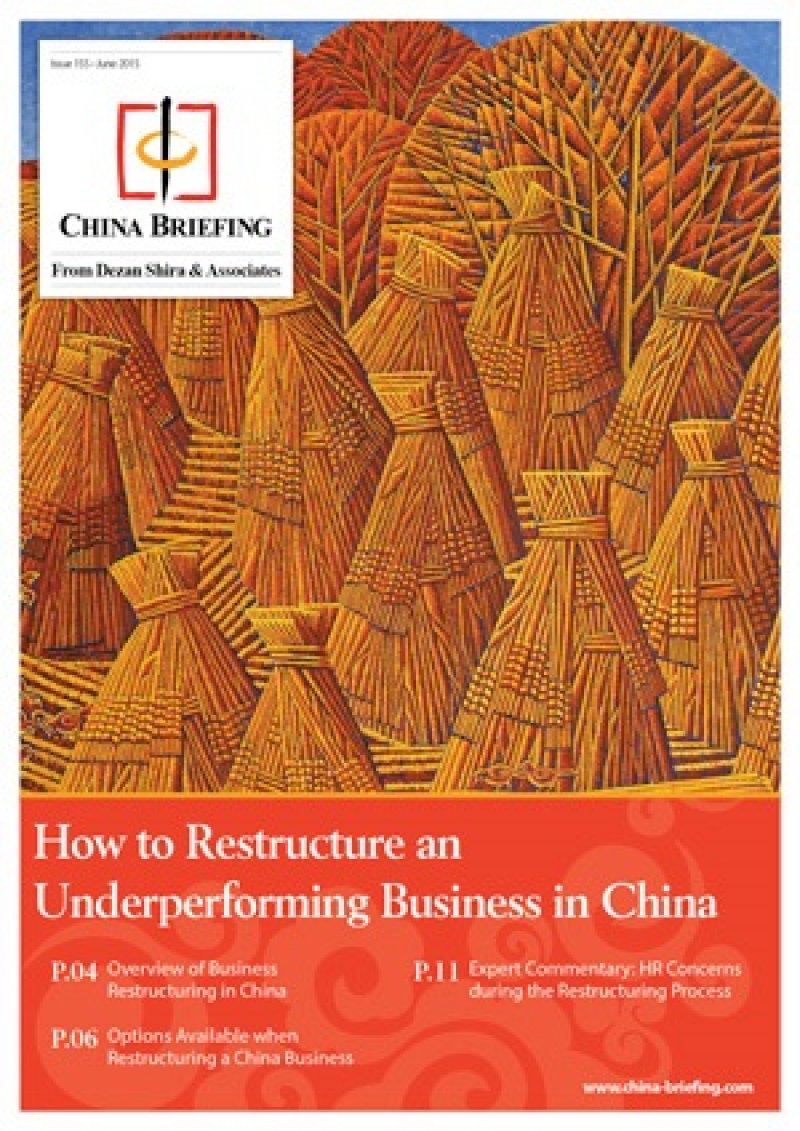Strategic Considerations when Establishing a WFOE in China, Part 2: Holding Companies & Corporate Names
By Chet Scheltema and Vivian Mao
Dezan Shira & Associates, Shanghai
WFOE Holding Company
Every investor of a WFOE in China will have to select the formal investor shareholder of the entity. The shareholder could be the ultimate beneficiary of all activities in China or could be an intermediary structure, otherwise known as a holding company.
Historically, investors may have been able to obtain certain preferential tax benefits by locating a holding structure in a legal jurisdiction that has negotiated a favorable tax treaty with China, such as Hong Kong. While this continues to be a reason to consider using an intermediary holding structure to establish one’s WFOE, the analysis is no longer as straightforward as it once was. Many countries home to traditional foreign investors (the United Kingdom, Netherlands, Ireland, etc.) have negotiated favorable tax treaties with China, eliminating the need to locate a holding company in jurisdictions such as Hong Kong. In any case, the ability to qualify for favorable tax benefits has become more difficult, as Chinese authorities have become wise to abuses and moved to close loopholes.
![]() RELATED: Strategic Considerations when Establishing a WFOE in China, Part 1
RELATED: Strategic Considerations when Establishing a WFOE in China, Part 1
Besides the potential tax benefits of utilizing a holding company, there remains a simple, straightforward reason to seriously consider establishing an intermediary holding structure to invest your WFOE in China. The simple reason is that, if at any later stage the investors wish to change the shareholders of the WFOE – as might occur during a restructuring or divestiture – it would be much simpler and faster if done outside China. Changing the formally registered shareholder of a WFOE under registration in China normally requires a tax clearance, potentially requires a formal valuation of the WFOE, and then requires the formal updating of the registration records of the WFOE with relevant Chinese government agencies. All of this could take months, give rise to substantial tax liabilities needing to be settled before being able to move forward, and the change of shareholder could in theory be blocked by Chinese authorities.
In contrast, completing all of the steps necessary to restructure or divest one’s ownership of a WFOE could be completed in days if conducted in certain jurisdictions. For this reason alone, investors in a WFOE should consider using an intermediary holding structure in an administratively friendly jurisdiction. Of course, one should consider all relevant factors in determining whether to utilize an intermediary holding structure, including the requirements of such jurisdiction and the impact upon the investor’s business globally.
WFOE Corporate Name
While any corporate name might suffice in a western jurisdiction – at least temporarily until a more suitable one is found – one would be wise not to choose hastily in China and to devote time and attention to selecting an appropriate corporate name for several reasons. Principally, changing the name is effectively the same as redoing the incorporation process, so it behooves investors to “get it right” from the beginning.
The option of using a “doing business as” name is not normally available in China, although a Chinese corporation may have an English name, besides its Chinese name, which could be carved into its business chops just like its Chinese name. However, it is only the Chinese name that is legally binding and effective.
The Chinese corporate name is an important initial consideration for other reasons that a foreign investor may not initially consider. Every corporate name contains the city of registration, and certain city names carry status and credibility that may be important when conducting sales, business development, government relations, or when finding investors. A recent client found himself in a debate and argument with his local sales team, because the local team felt the name “Shenzhen” was inhibiting their sales efforts with government agencies in Beijing, whereas the foreign investor felt the time and expense of reincorporating in Beijing just to obtain “Beijing” in the name would not be justified.
The formula for determining a Chinese corporate name is rigid, offering little flexibility. There are normally four basic elements in the following order: (i) unique name, (ii) industry sector (e.g., manufacturing, consulting, trading, etc.), (iii) the city of incorporation (e.g., Beijing, Shanghai, etc.), and the corporate structure (e.g., limited liability company, partnership, etc.). For instance, a company’s name might be ABC Trading (Shanghai) Limited Company. Originality is usually only possible in the initial few characters. Since China’s corporate registry is national, desirable characters are quickly secured by others, leaving few options.
Besides these structuring limitations, the Chinese language presents further pitfalls. Characters may have multiple pronunciations and meanings, so one must choose carefully. A previous client had to rethink its choice of name when it was discovered that the first choice was also the widely accepted translation into Chinese of an infamous European dictator’s name. Of course, this is a problem in any language, and readers are probably familiar with the well-known example of the introduction of Chevy’s Nova coupe into Spanish speaking countries, where “no va” means “doesn’t go” in Spanish, but the Chinese language presents its own particular challenges.
![]() RELATED: Corporate Establishment Services from Dezan Shira & Associates
RELATED: Corporate Establishment Services from Dezan Shira & Associates
WFOE Registered Address
In order to receive permission to incorporate a WFOE, MOFCOM generally still requires evidence of a twelve month lease at an address authorized to let to foreign investors for purposes of incorporation. While it is true that local authorities may from time to time relax this requirement when approving incorporation, especially if one established in a special investment area or in a special custom zones, the general rule remains the same across China. And there are several reasons why the selection of a registered address and office lease is of strategic importance.
One basic reason is that it will determine the tax jurisdiction in which the WFOE is registered – attempts to change jurisdictions later can meet resistance, and the requirements necessary to make a move become disruptive to operations and business activities. Each Chinese tax jurisdiction, and there may be many in any given city, will jealously guard its tax revenue, so when the WFOE announces it would like to move to another tax jurisdiction, in-charge tax officials may seek to delay or prevent the transfer, often depending upon how much revenue the WFOE is generating in the current tax jurisdiction. And there may be financial risks in such a move. A tax clearance will be required before any move may be made, and unhappy in-charge tax officials may make a point of searching for and uncovering previously unpaid taxes. Finally, because the books will need to be closed to proceed with the tax clearance, business activities may be interrupted.
Another reason to consider the registered address is that some Chinese tax districts lack experience dealing with international clientele and cross-border transactions. This could adversely affect the WFOE’s ability to conduct business. Additionally, the sophistication of tax districts can vary even within an otherwise international city. For instance, Beijing and Shanghai are divided into numerous tax districts, and the overwhelming majority of multinationals and WFOEs in Beijing would be located in Chaoyang and Haidian. Although still located within Beijing, other tax districts may have little experience working with cross-border transactions.
In one instance, one client seeking to remit monies from a less international tax district back to its headquarters in Europe discovered that the local tax bureau did not have Austria in its system, and so the transaction was delayed a week while authorities worked to add it. So while it may initially seem attractive to “set up shop” in a development zone or city or district seeking to entice investors with promises of benefits and special treatment, including potentially the option to use a “virtual address,” it may be more strategic in the long run to make the investment in a tax jurisdiction with an established record of handling international transactions.
In the final article of this three-part series, we focus on VAT, corporate governance, and provide some concluding remarks on establishing a WFOE in China.
|
Asia Briefing Ltd. is a subsidiary of Dezan Shira & Associates. Dezan Shira is a specialist foreign direct investment practice, providing corporate establishment, business advisory, tax advisory and compliance, accounting, payroll, due diligence and financial review services to multinationals investing in China, Hong Kong, India, Vietnam, Singapore and the rest of ASEAN. For further information, please email china@dezshira.com or visit www.dezshira.com. Stay up to date with the latest business and investment trends in Asia by subscribing to our complimentary update service featuring news, commentary and regulatory insight. |
![]()
 An Introduction to Doing Business in China 2015
An Introduction to Doing Business in China 2015
Doing Business in China 2015 is designed to introduce the fundamentals of investing in China. Compiled by the professionals at Dezan Shira & Associates, this comprehensive guide is ideal not only for businesses looking to enter the Chinese market, but also for companies that already have a presence here and want to keep up-to-date with the most recent and relevant policy changes.
How to Restructure an Underperforming Business in China
In this issue of China Briefing magazine, we explore the options that are available to foreign firms looking to restructure or close their operations in China. We begin with an overview of what restructuring an unprofitable business in China might entail, and then take an in-depth look at the way in which a foreign company can go about the restructuring process. Finally, we highlight some of the key HR concerns associated with restructuring a China business.
 Adapting Your China WFOE to Service China’s Consumers
Adapting Your China WFOE to Service China’s Consumers
In this issue of China Briefing Magazine, we look at the challenges posed to manufacturers amidst China’s rising labor costs and stricter environmental regulations. Manufacturing WFOEs in China should adapt by expanding their business scope to include distribution and determine suitable supply chain solutions. In this regard, we will take a look at the opportunities in China’s domestic consumer market and forecast the sectors that are set to boom in the coming years.
- Previous Article China veröffentlicht den neuen Entwurf über die Regelung der Verrechnungspreisdokumentation
- Next Article A Guide to China’s Free Trade Zones – New Issue of China Briefing Magazine










